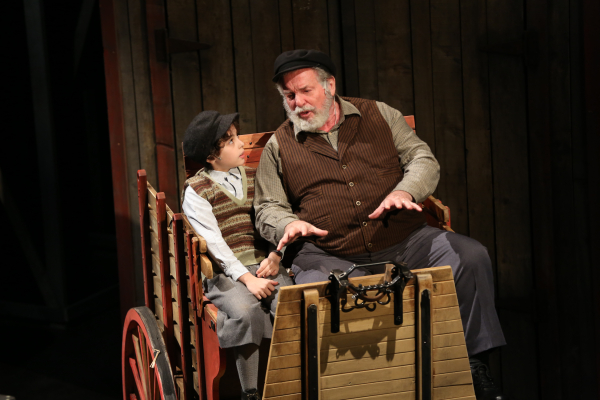Lies My Father Told Me

(© 2013 Michael Priest Photography)
Fiddler on the Roof may come to mind while watching Lies My Father Told Me, a new musical based on the works of Ted Allan, directed by Bryna Wasserman, and produced by the National Yiddish Theatre — Folksbiene at Baruch Performing Arts Center. The Tevye-like grandfather and the conflicts between tradition and modernity lend a charming and endearing familiarity to this tale of lost innocence. But unlike Fiddler, Lies My Father Told Me leaves a disquieting sound of bad blood pulsing in the ears.
Seen through the eyes of Older David (Joe Paparella, who narrates and sings throughout), the story revolves around Young David (Alex Dreier), a Jewish boy living in Montreal with his parents, Harry (Jonathan Raviv) and Annie (Russell Arden Koplin), and his grandfather Zaida (Chuck Karel). Harry, a secular-minded inventor, is always on the verge of something big, but he's never able to deliver the goods. And he's constantly hitting up the religious Zaida for a loan to finance his latest scheme. Harry and his brother-in-law, Benny, go into business together to manufacture permanently creased pants, an enterprise that goes belly-up in no time. As Harry grows frustrated with his life and becomes abusive toward his family, David comes to see his father as a spinner of lies, particularly whenever Harry denigrates Zaida's religious beliefs. David's world comes to revolve solely around Zaida. But when Harry tells David a "lie" about Zaida, David's world comes crashing down.
With music, lyrics, and orchestration by Elan Kunin, and a wonderful ensemble of seven musicians, the songs and lyrics have a charming, familiar ring — and the vocal talent on display is plentiful. One of the show's opening numbers, "Magic Wings," is a delightful duet, sung by Dreier and the wonderful, endearing Karel, in which Zaida and David imagine they're flying to distant lands in Zaida's horse-drawn cart. Raviv, Koplin, and Jonathan Hadley (who plays Benny) belt out the raucous "Uptown." The inspired "Bankrupt," sung by kids Dreier, Ashley Brooke, and Jeremiah Burch, earns well-deserved laughs. And the poignant and tender "Maybe Someday," a highlight of the show sung longingly by the dulcet-voiced Koplin, may bring a tear to the eye of anyone who has suffered for love.
The story also incorporates a familiar palette of minor characters who add some local color. There's Mrs. Tanner (Renée Bang Allen), the querulous neighbor; Edna (Leisa Mather), the town prostitute; Mr. Baumgarten (Gordon Stanley), the resident Marxist; and Cleo (Brooke), David's little friend and confidante. Though we’ve seen the likes of them before, these characters delight in their own ways with songs tailored to their personalities. Two standouts are Mr. Baumgarten's anti-capitalist rant, "Politics," and Edna's humorous retort to Mrs. Tanner, "I'm Not Leaving."
All of them interact on John C. Dinning's well-crafted set, which creates the town in microcosm and captures the story's inherent tension between past and present. Zaida's stable, which houses his beloved horse, Ferdeleh, stands in the midst of a town eager to let go of some of its old ways. The two floors of David's house sit on a platform that revolves to reveal new rooms as scenes change. Such sets have been constructed before, but Dinning's deserves a nod for capturing the essence of a small town caught between its Old World traditions and the encroaching pressures of modernity.
What ultimately troubles the show is Older David's seemingly unyielding resentment toward his father. It is forced upon viewers from the harsh-sounding title of the show to its final song, "Lies": "My father never told the truth / Never once in all my youth." We expect more than griping from Older David in the end, even if it is justified, especially after Zaida, in one of his Tevye moments, teaches David to honor his father. That lesson seems to have been forgotten, and without some resolution to this father-son conflict, the story feels incomplete. In an otherwise likeable musical, Lies My Father Told Me examines the moment when innocence cracks under the weight of experience, but not the growth that such an experience should bring.










